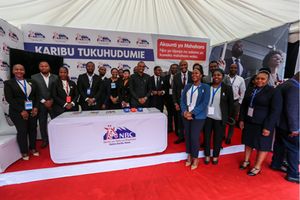Government must come clean on UDSM hostels

What you need to know:
The debate is centred around the quality of the construction, whether TBA is telling the truth in its defence of what has happened, the real cost of the project that was President John Magufuli’s brainchild and the arrest of the student who reportedly shared photos of the cracks on social media.
The Tanzania Building Agency (TBA) is currently embroiled in a controversy involving the construction of University of Dar es Salaam hostels, part of which are the subject of a debate about cracks that developed only a few weeks after the buildings were occupied. The cracks, first revealed by a student leader concerned about the safety of occupants, have drawn varied reactions from both the authorities and the general public.
The debate is centred around the quality of the construction, whether TBA is telling the truth in its defence of what has happened, the real cost of the project that was President John Magufuli’s brainchild and the arrest of the student who reportedly shared photos of the cracks on social media.
Following the revelation about the condition of the hostels, TBA has come out to assure that the cracks were “anticipated”. TBA argues that there is nothing to be worried about and that the cracks were related to “expansion joints” which are meant to allow for newly constructed buildings “to adjust”. This explanation, however, flies in the face of logic if the size and location of some of the cracks on one of the hostel blocks is taken into account. It is inconsistent with the explanation about the “expansion joints.”
It is therefore prudent for the government to consider an independent investigation to establish the veracity of the TBA claim, and establish what any safety measures need to be taken to protect the lives of those living in the quarters should there be sufficient grounds that TBA may have indeed messed up.
The government should also move fast to address questions about the real cost of the project. There are reports that over Sh45 billion, and not Sh10 billion, was spent. The public needs to be told the truth. The authorities should also shun sideshows in this matter and address the real problem. Arresting the student who acted as a whistleblower is to stoop too low. After all, being a student leader required him to do what he did.
Feed the nation well
Malnutrition remains a major problem in Tanzania. This is the lack of proper nutrition caused by lacking enough food; not eating nutritious foods – or the body being unable to use the food that is eaten.
If the problem is not surmounted, it leads to stunting – generally more pronounced among children under-five.
But, how come a country that is well endowed with huge arable land fails to feed its people properly? Could it be lack of awareness… or poor distribution of nutritious food?
A workshop that will bring together participants from Tanzania, Uganda, Rwanda and Ethiopia has been organised in Moshi, Kilimanjaro Region, starting tomorrow.
Through it, participants will learn new rice-cultivating techniques, courtesy of the Japan International Cooperation Agency.
Rice has traditionally been a staple in Tanzania, although its production in terms of cost, quality and volumes has not been particularly laudable. In that regard, it is indeed time that we adopted the best practice modality in rice farming to stave off hunger and the resulting malnutrition.
Feeding the nation properly is pivotal to attaining sustainable socio-economic development. A hungry society is always a poor, underdeveloped society, and creative individuals are often those who are properly fed. Therefore, let us properly feed the nation to ensure that industrialisation becomes a reality on the ground.




